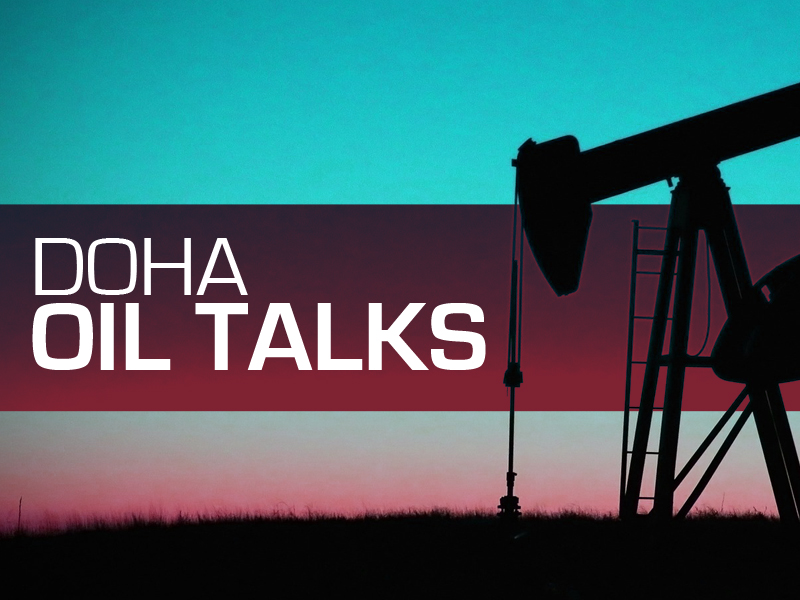

The fundamental cause of turmoil in oil markets since late 2014 has been too much of the stuff. With the Organization of the Petroleum Exporting Countries (OPEC) refusing to cut output, with more and more oil coming from non-OPEC producers such as the United States, and, more recently, with Iran's production increasing as the country emerges from international sanctions, the world just kept producing more oil than anyone wanted to consume, and prices tanked.
A much-watched meeting in Doha, Qatar, on Sunday is meant to change that situation by bringing many OPEC and non-OPEC countries to agree to an oil production "freeze" - building on an agreement reached in February between Saudi Arabia, Russia, Qatar and Venezuela. Under the proposed freeze, participating countries would produce only what they did in January, and no more, up through October.
Brent crude, the global oil benchmark, tanked to below $ 28 per barrel in January as the oversupply problem remained unabated, but that appeared to be a temporary market bottom, and prices have since surged to a recent quote of $43.10 for Brent. Much of the reason has been the February agreement and expectations that the Doha meeting would be successful.
Recent headlines, though, have raised doubts. Iran, which is trying to roar back into oil markets now that sanctions linked to its nuclear program have been lifted, has said that it will not participate in a freeze - irking rival Saudi Arabia, the dominant OPEC producer, which has insisted that all OPEC members must agree to a freeze. Early reports out of Doha on Sunday suggest that this tension is impairing progress. A failure of the meeting, some fear, could lead prices to tank again.
In the United States, meanwhile, low oil prices have impaired shale oil production, but if prices keep rising, shale oil could kick up again. (The United States, which had surged in recent years to become the world's largest producer of crude oil and other petroleum liquids, is not part of the Doha meeting.)
Perhaps the bigger issue is whether a Doha deal would actually alter the supply-and-demand balance much on its own - or if, rather, the world's markets are in the process of naturally sorting this out anyway.
On the one hand, the Doha agreement would be quite significant in that it would represent a measure of coordination between OPEC, which produces more than a third of the world's oil, and Russia, the second-largest producer.
Yet that alone may not alter the global oil math much. "With Saudi Arabia and Russia already producing at or near record rates and very little upside seen apart from Iran - which has vowed to ramp up production to a pre-sanctions level of 4 [million barrels per day] - any deal struck will not materially impact the global supply-demand balance" during the first half of this year, the International Energy Agency (IEA) wrote of the Doha meeting last week.
The IEA, an influential voice in oil markets, believes that oil demand and supply will rebalance substantially later this year, but not necessarily because of what happens in Doha. Rather, it expects a 1.2 million barrels-per-day growth in oil demand in 2016, combined with declining oil output in countries such as the United States, whose shale oil upstarts have been hurt by low prices, to be the key factor.
The world produces about 96.4 million barrels per day of oil, according to the IEA's latest report, and demand is just 94.8 million barrels per day, as of the first quarter of 2016. However, by the end of the year, that demand is expected to rise, leaving overall demand for the year at 95.9 million barrels per day, which would represent a tightening of the market, assuming that supply does not increase further.
In the longer term, though, all this focus on how much oil the world pumps daily could be missing something.
Long-term trends also are a key part of the destabilization of the oil market of late, including little growth in oil demand in advanced economies. "Rich countries' oil use peaked in 2005. Developing countries' oil demand is moderating," Amory Lovins, head of the influential energy think tank the Rocky Mountain Institute, wrote last year.
One reason, Lovins notes, is that cars have gotten considerably more efficient, using less gasoline. And the beginnings of an electric vehicle wave is clearly apparent across the world. These vehicles won't use any oil.
In the long term, then, just how much oil each country pumps may not be the only thing that parties gathered in Doha have to worry about.
The Washington Post




